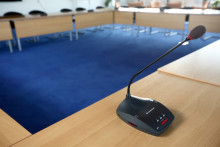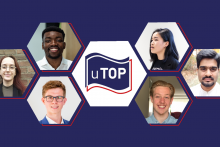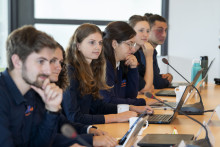What exactly does your party support?
Sjoerd van den Belt (UReka): 'Our party focuses on the content. We try to form a constructive opinion through conversations - among ourselves and with fellow students. For UReka, education is a core issue. In the end, that is what students come to university for. The Covid crisis has not done the quality of education any good, and neither has it helped student activism. We therefore want to return to physical education as soon as possible. In the coming period, the UT must also make as much use as possible of the options that are available to get students to come to the campus physically.'
Jorg Wellink* (uTOP): 'We aim to be a university where students are prepared for the challenges they will face in a rapidly changing society. uTOP therefore always looks from the outside in. What is going on in society and how can the UT respond to this? There are currently three gaps which we as a university need to close. First of all, the difference between international students and students from the Netherlands. We believe in an international university. UTOP also wants to close the gap between the university and the industry. We are in favor of more real assignments from the industry, instead of fictitious ones from professors. And finally, we want to connect students with the Twente region, because it is a pity that so many talented people leave this region after their studies.’
Giel van Weezel (DAS): 'The name of our party says it all. We stand for the ambitious student. At the moment there are one hundred and forty associations at the UT, all of which run entirely by students. It is extremely important that students are able to develop themselves alongside their studies. It is vital that students should be able to develop themselves alongside their studies, for example by spending a year on a board or by playing an active role in sport and culture. That is what we stand for as a party.
Who should vote for you?
Van Weezel (DAS): 'We think that our programme meets the wishes of the vast majority of students. DAS is there for everyone. I myself have been able to fully enjoy student life for five years, thanks to various committees, boards and activities, and I think that every student at the UT should have that opportunity.
Wellink (uTOP): 'International students should vote for uTOP, because we strongly support this group. But that does not mean that we are not there for Dutch students. We want to represent this group in the University Council as well.’
Van den Belt (UReka): 'UReka is there for all students. This is also reflected in our diverse electoral list. We explicitly do not focus on one group, because the University Council aims to represent all students.’
How is your party different from the other two?
Wellink (uTOP): 'As I said, our party looks from the outside in. At DAS and UReka it is mainly the other way around. uTOP is also a real entrepreneurial party. At the moment, the university still determines in what way students can be active and entrepreneurial through the FOBOS regulation. We advocate activism on your own terms. In other words: starting your own business is activism as well. Why is there such a thing as a top sports programme but no regulation for top entrepreneurs?’
Van Weezel (DAS): 'In the end, I think that the goals of the parties are quite similar. If you look at the origins of our target group, DAS voters have traditionally been active in the UT's sports clubs and student associations. That's why activism is very important for our party. But the quality of education is just as important to us.'
Van den Belt (UReka): 'In comparison with DAS, our electoral list is a lot more international. And our party always focuses on the content of the matter. You can see that in the extensive party programme as well.’
What do you want to achieve in particular next year?
Van Weezel (DAS): ‘Our party is aiming for more recognition of activism. Think, for example, of a recognised board minor for which students receive study credits. In this area, the UT is still lagging behind other universities.’
Wellink (uTOP): 'We want a university vacancy database, which every UT student can register for. It's a single place where all the internships, relevant part-time jobs and projects of companies or teachers are collected. We don't have anything like that yet and we'd like to make it happen.’
Van den Belt (UReka): 'The quality of education remains the most important issue. We must return to the situation before Covid. The right of co-option is also an important discussion. There are clearly two sides to this discussion. UReka recognises that there is a problem for international students. But abolishing co-optation is not the solution. Indeed, internationals also reap the benefits of the system, which you can see in several mixed campus houses. The core of the problem is the lack of housing. In addition, there is the lack of communication towards international students. They don't know how the system works and what is expected of them.’
What did your party achieve in the recent past?
Van den Belt (UReka): 'As the University Council, we primarily monitor and advise the Executive Board. That is the main task of the council. But in the past our party has also taken the initiative with new ideas. For example, we worked on a project where international students were given the opportunity to get to know the Dutch labour market. That is beneficial for the region and for the students themselves.’
Van Weezel (DAS): 'TOM 2.0 is an important achievement for us. This flexibilisation of the educational system ensures that activism remains possible. In recent years, we have also fought for sufficient facilities on the campus. The question is what that will look like after the pandemic. Will there still be enough study places available, for example? We also initiated the discussion on the right of co-option. We believe that adjustments can be made without abolishing it altogether. We therefore advocate an up-to-date version of the right of co-option.’
Wellink (uTOP): ‘We have been participating for one year now. Despite our small vote (last year uTOP had one seat in the council, ed.) our influence has been significant. I have to give all the credit for that to Lefika Otisitswe, who was in the council for uTOP last year. From day one, Lefika raised the Black Lives Matter movement with the Executive Board. I don't want to say that it was entirely due to uTOP, but two months later the Executive Board sent an e-mail in which Black Lives Matter was mentioned. We also took a different stance on co-optation. uTOP is not against the phenomenon of students being able to choose their own roommates, but we believe that everyone should have an equal chance, including international students. We think it is important to look at the discussion from the perspective of the international student.’
Finally, a prediction. How many seats will you get?
Van Weezel (DAS): ‘We are the party for the ambitious student. But maybe all the seats - nine in total - are a bit much. At the moment, DAS has three seats. We would like a few more. This year, we are going for four or more.’
Wellink (uTOP): 'We have three candidates and we are going for the maximum: three seats.’
Van den Belt (UReka): 'If we can run a good campaign, online and, if possible, on campus, we are going to get six seats.’
* Jorg Wellink is not the main candidate on the uTOP list, but as number three on the list, he has been appointed spokesman. That is why U-Today spoke with him.






